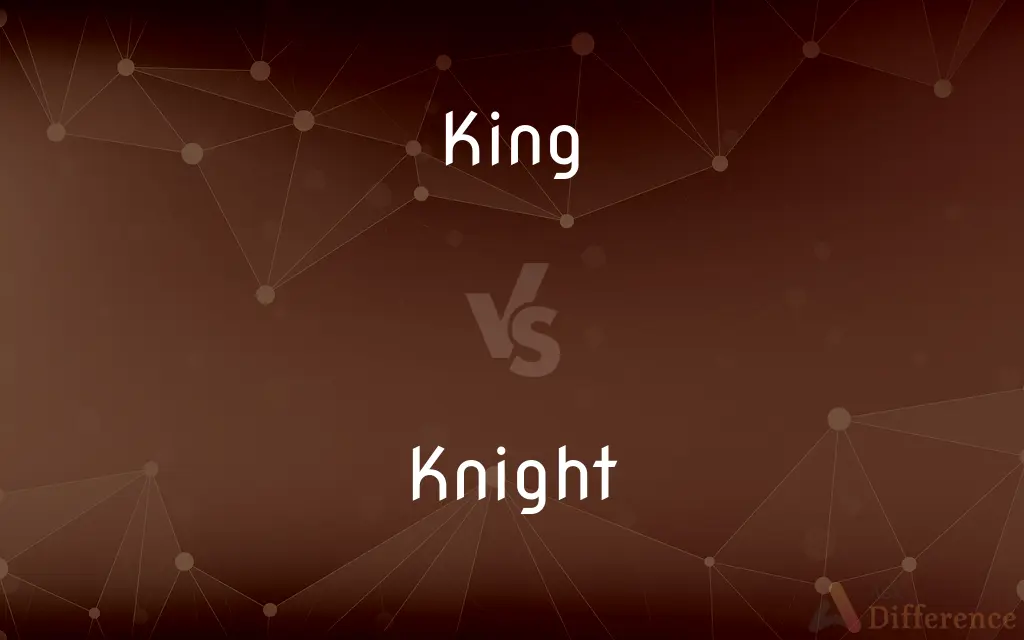King vs. Knight — What's the Difference?
By Fiza Rafique & Urooj Arif — Updated on April 20, 2024
Kings rule over territories and hold the highest authority within a monarchy, whereas knights are warriors granted titles and land in service to a king.

Difference Between King and Knight
Table of Contents
ADVERTISEMENT
Key Differences
Kings hold sovereign power over a kingdom and embody the state's authority, while knights are members of the noble class, often serving as elite fighters and landholders under the king's command.
In a monarchy, kings are often seen as the top of the social hierarchy, possessing rights to legislate and govern, whereas knights, though respected, primarily have responsibilities in military service and local governance.
Kings can make broad political decisions and form international alliances, while knights focus more on local issues and military engagements, serving as commanders or elite soldiers.
The role of a king is inherited or acquired through complex succession lines, emphasizing the continuity of leadership, whereas knights are typically appointed based on merit, bravery, or service to the crown.
Kings often serve as symbolic figures of national unity and cultural identity, while knights are celebrated for their valor, chivalry, and personal achievements in battle.
ADVERTISEMENT
Comparison Chart
Role in Society
Highest ruling authority in a monarchy
Military elite and minor nobility
Source of Title
Hereditary or through succession
Granted by a king for service
Responsibilities
Governance, law-making, diplomacy
Military service, local governance
Symbolic Value
Represents state and national identity
Embodies chivalry and martial prowess
Social Status
Top of the social hierarchy
High, but below royals
Compare with Definitions
King
A male monarch of a major territorial unit; especially : one whose position is hereditary and who rules for life.
The king decreed a new law to improve trade.
Knight
A man honored by a sovereign for merit and ranked next below a baronet.
The knight was granted lands for his bravery.
King
A person or thing preeminent in its class.
Elvis Presley is often called the King of Rock and Roll.
Knight
A person devoted to the service of a lady as her attendant or champion.
The knight swore to uphold the honor of his lady.
King
The chief authority over a country and people.
The king held a summit to discuss regional security.
Knight
A member of an order or society.
He was a Knight of the Order of the Garter.
King
The principal piece of each color in chess.
Protecting your king is the primary goal in chess.
Knight
A mounted soldier serving under a feudal superior in the Middle Ages.
The knights assembled for the tournament.
King
A playing card bearing the picture of a king.
He played the king of diamonds.
Knight
A chess piece, usually shaped like a horse's head, that moves in an L-shape.
He moved his knight to capture a pawn.
King
King is the title given to a male monarch in a variety of contexts. The female equivalent is queen, which title is also given to the consort of a king.
Knight
A knight is a person granted an honorary title of knighthood by a head of state (including the pope) or representative for service to the monarch, the church or the country, especially in a military capacity.Knighthood finds origins in the Greek hippeis and hoplite (ἱππεῖς) and Roman eques and centurion of classical antiquity.In the Early Middle Ages in Europe, knighthood was conferred upon mounted warriors. During the High Middle Ages, knighthood was considered a class of lower nobility.
King
A male sovereign.
Knight
A medieval tenant giving military service as a mounted man-at-arms to a feudal landholder.
King
One that is supreme or preeminent in a particular group, category, or sphere
"In many countries, soccer is the king of sports" (Cameron W. Barr).
Knight
A medieval gentleman-soldier, usually high-born, raised by a sovereign to privileged military status after training as a page and squire.
King
A man chosen as the winner of a contest or the honorary head of an event
A homecoming king.
Knight
A man holding a nonhereditary title conferred by a sovereign in recognition of personal merit or service to the country.
King
Abbr. K A playing card bearing the figure of a king, ranking above a queen.
Knight
A man belonging to an order or brotherhood.
King
Abbr. K The principal chess piece, which can move one square in any direction and must be protected against checkmate.
Knight
A defender, champion, or zealous upholder of a cause or principle.
King
A piece in checkers that has been moved to the last row on the opponent's side of the board and been crowned, thus becoming free to move both forward and backward.
Knight
The devoted champion of a lady.
King
Kings(used with a sing. verb) See Table at Bible.
Knight
Abbr. Kt or N(Games) A chess piece, usually in the shape of a horse's head, that can be moved two squares along a rank and one along a file or two squares along a file and one along a rank. The knight is the only piece that can jump other pieces to land on an open square.
King
A king-size bed.
Knight
To raise (a person) to knighthood.
King
Principal or chief, as in size or importance.
Knight
(historical) A young servant or follower; a trained military attendant in service of a lord.
King
Of or relating to a king-size bed
King sheets.
A king bed skirt.
Knight
(historical) A minor nobleman with an honourable military rank who had served as a page and squire.
King
To make (a piece in checkers) into a king; crown.
Knight
(by extension) An armored and mounted warrior of the Middle Ages.
King Arthur and the Knights of the Round Table
King
A male monarch; a man who heads a monarchy. If it is an absolute monarchy, then he is the supreme ruler of his nation.
Henry VIII was the king of England from 1509 to 1547.
Knight
A person obliged to provide knight service in exchange for maintenance of an estate held in knight's fee.
King
A powerful or majorly influential person.
Howard Stern styled himself as the "king of all media".
Knight
(modern) A person on whom a knighthood has been conferred by a monarch.
King
Something that has a preeminent position.
In times of financial panic, cash is king.
Knight
(literary) A brave, chivalrous and honorable man devoted to a noble cause or love interest.
King
A component of certain games.
Knight
(chess) A chess piece, often in the shape of a horse's head, that is moved two squares in one direction and one at right angles to that direction in a single move, leaping over any intervening pieces.
King
(chess) The principal chess piece, that players seek to threaten with unavoidable capture to result in a victory by checkmate. It is often the tallest piece, with a symbolic crown with a cross at the top.
Knight
A playing card bearing the figure of a knight; the knave or jack.
King
(card games) A playing card with the letter "K" and the image of a king on it, the thirteenth card in a given suit.
Knight
(entomology) Any of various nymphalid butterflies of the genus Ypthima.
King
A checker (a piece of checkers/draughts) that reached the farthest row forward, thus becoming crowned (either by turning it upside-down, or by stacking another checker on it) and gaining more freedom of movement.
Knight
(modern) Any mushroom belonging to genus Tricholoma.
King
The central pin or skittle in bowling games.
Knight
(transitive) To confer knighthood upon.
The king knighted the young squire.
King
A king skin.
Oi mate, have you got kings?
Knight
To promote (a pawn) to a knight.
King
A male dragonfly; a drake.
Knight
A young servant or follower; a military attendant.
King
A king-sized bed.
Knight
In feudal times, a man-at-arms serving on horseback and admitted to a certain military rank with special ceremonies, including an oath to protect the distressed, maintain the right, and live a stainless life.
Knights, by their oaths, should right poor ladies' harms.
King
(graph theory) A vertex in a directed graph which can reach every other vertex via a path with a length of at most 2.
Knight
A piece used in the game of chess, usually bearing a horse's head.
King
To crown king, to make (a person) king.
Knight
A playing card bearing the figure of a knight; the knave or jack.
King
To rule over as king.
Knight
To dub or create (one) a knight; - done in England by the sovereign only, who taps the kneeling candidate with a sword, saying: Rise, Sir --.
A soldier, by the honor-giving handOf CŒur-de-Lion knighted in the field.
King
To perform the duties of a king.
Knight
Originally a person of noble birth trained to arms and chivalry; today in Great Britain a person honored by the sovereign for personal merit
King
To assume or pretend preeminence (over); to lord it over.
Knight
A chessman in the shape of a horse's head; can move two squares horizontally and one vertically (or vice versa)
King
To promote a piece of draughts/checkers that has traversed the board to the opposite side, that piece subsequently being permitted to move backwards as well as forwards.
Knight
Raise (someone) to knighthood;
The Beatles were knighted
King
To dress and perform as a drag king.
King
A Chinese musical instrument, consisting of resonant stones or metal plates, arranged according to their tones in a frame of wood, and struck with a hammer.
King
A chief ruler; a sovereign; one invested with supreme authority over a nation, country, or tribe, usually by hereditary succession; a monarch; a prince.
Kings will be tyrants from policy, when subjects are rebels from principle.
There was a State without king or nobles.
But yonder comes the powerful King of Day,Rejoicing in the east
King
One who, or that which, holds a supreme position or rank; a chief among competitors; as, a railroad king; a money king; the king of the lobby; the king of beasts.
King
A playing card having the picture of a king{1}; as, the king of diamonds.
King
The chief piece in the game of chess.
King
A crowned man in the game of draughts.
King
The title of two historical books in the Old Testament.
King
To supply with a king; to make a king of; to raise to royalty.
Those traitorous captains of Israel who kinged themselves by slaying their masters and reigning in their stead.
King
A male sovereign; ruler of a kingdom
King
A competitor who holds a preeminent position
King
A very wealthy or powerful businessman;
An oil baron
King
Preeminence in a particular category or group or field;
The lion is the king of beasts
King
United States woman tennis player (born in 1943)
King
United States guitar player and singer of the blues (born in 1925)
King
United States charismatic civil rights leader and Baptist minister who campaigned against the segregation of Blacks (1929-1968)
King
A checker that has been moved to the opponent's first row where it is promoted to a piece that is free to move either forward or backward
King
One of the four playing cards in a deck bearing the picture of a king
King
(chess) the weakest but the most important piece
Common Curiosities
How do the living quarters of a king compare to those of a knight?
Kings usually reside in palaces or castles, signifying their status and role, while knights may live in manor houses or smaller castles granted to them by the sovereign.
What educational training do kings and knights receive?
Kings are often educated in governance, law, and diplomacy from an early age. Knights receive training primarily in warfare, strategy, and sometimes in courtly manners.
Can a knight become a king?
It is rare and usually not traditional for a knight to become a king unless through marriage or extraordinary circumstances such as conquest or popular acclaim.
What types of governance systems support kings and knights?
Kings operate within monarchies that can be absolute or constitutional. Knights function within feudal systems where loyalty and military service are pivotal.
How do kings and knights contribute to their societies?
Kings provide leadership, make laws, and shape the political landscape, while knights defend the realm, enforce laws locally, and maintain order.
In what ways do kings and knights interact with each other?
Knights serve as part of the king’s retinue, providing military and sometimes administrative support, while kings grant titles, lands, and missions to knights.
How do historical examples of kings and knights differ?
Historical kings like Henry VIII and Louis XIV had immense influence over national and international policies. Knights such as Sir Lancelot or Sir William Marshal are celebrated for individual valor and specific heroic deeds.
What are the familial responsibilities of kings and knights?
Kings have dynastic responsibilities, needing to secure succession and alliances through marriage. Knights focus on managing their estates and providing for their immediate family.
How do kings and knights prepare for their roles differently?
Kings are prepared for leadership and statecraft from a young age, often through formal education and advisory roles. Knights undergo rigorous physical training and learn combat skills.
What symbols are associated with kings and knights?
Kings are often associated with crowns, scepters, and thrones, symbolizing their authority and governance. Knights are associated with armor, swords, and shields, reflecting their martial roles.
How is the public perception of kings different from that of knights?
Kings are seen as overarching leaders whose decisions impact the entire country, while knights are often romanticized as heroic figures of valor and honor.
How do the retirement or end of service differ for kings and knights?
Kings typically reign until death or abdication, while knights can retire from active duty, often retaining their titles and continuing to manage their lands.
What ceremonies are associated with kings and knights?
Kings have coronations, where they are formally crowned. Knights have knighting ceremonies, where they are bestowed their title often with a ceremonial dubbing.
What kind of financial support do kings and knights receive?
Kings receive revenue from the entire realm, including taxes and tributes, whereas knights might be granted lands that provide them with income.
What legal powers do kings have compared to knights?
Kings have the authority to make and change laws, bestow pardons, and declare war. Knights have limited judicial powers, primarily in local disputes and minor legal matters.
Share Your Discovery

Previous Comparison
Top vs. Topmost
Next Comparison
Inquiry vs. InquisitionAuthor Spotlight
Written by
Fiza RafiqueFiza Rafique is a skilled content writer at AskDifference.com, where she meticulously refines and enhances written pieces. Drawing from her vast editorial expertise, Fiza ensures clarity, accuracy, and precision in every article. Passionate about language, she continually seeks to elevate the quality of content for readers worldwide.
Co-written by
Urooj ArifUrooj is a skilled content writer at Ask Difference, known for her exceptional ability to simplify complex topics into engaging and informative content. With a passion for research and a flair for clear, concise writing, she consistently delivers articles that resonate with our diverse audience.














































